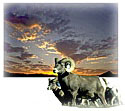Best of the Year 2012
By Ron Watters
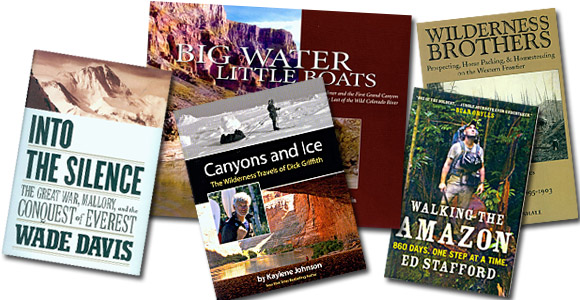
Best of the Year Books of 2012 includes:
Winners of the National Outdoor Book Awards
.
And the following . . .
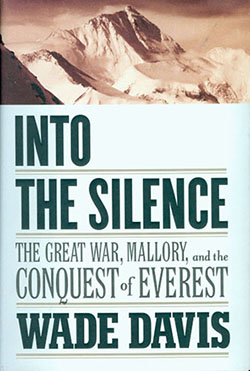
Best of 2012
Into the Silence: The Great War, Mallory and the Conquest of Everest. By Wade Davis. Alfred A. Knoff, New York. ISBN 9780375408892
Every so often a book comes along that is so good that you have to slow down, turn the pages languidly, and savor the time you spend with it. Into the Silence is one of those books.
It is the story of George Mallory and his attempts to reach the summit of Everest. There has been much written about Mallory, but Wade Davis creates a picture of the man like none other.
Mallory was a part of Great Britain’s World War I generation, a generation that was almost entirely wiped out in the trenches of the Western Front. Yet, from the mud and filth of those trenches arose a cadre of climbers who set their sights on a far more laudable goal: the airy summits of the Himalayas.
Their quest became the quest of a nation, a way for Britain to cleanse itself and to seek a more hopeful future by putting the horrors of the war behind. Wade traces Mallory, and the primary players of the Everest quest, through those terrible years until they finally arrive at the foot of the great mountain.
But climbing Everest was only half the battle. Both Nepal and Tibet, wary of foreigners, had closed their borders to outsiders. Nepal was clearly unreachable. Thus, early expeditions focused on Tibet, and through sensitive diplomatic maneuvering, obtained permission for expeditions in 1921, 1922 and 1924.
On the first expedition in1921, very little time was spent climbing. Almost all of their energies went into finding a way to the base of the mountain, and once reached, locating a possible route to the top.
By 1924, however, climbers had done all that and had pioneered a route which they believe could lead them to success. It was late in the 1924 expedition, with the summit still unattained, that Mallory and his climbing partner Andrew Irvine positioned themselves for one final attempt. An observer lower on the mountain watched them ascend and then disappear into the mists of the upper mountain . . . disappearing forever into the silence.
Don’t miss out on this one. Into the Silence is outstanding on all counts: a richly told, sweeping historical narrative. But take your time. Read it slowly and savor every minute.
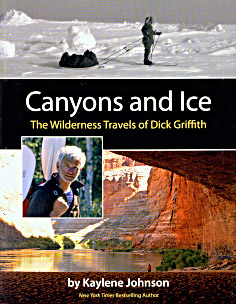
Best of 2012
Canyons and Ice: the Wilderness Travels of Dick Griffith. By Kaylene Johnson, Ember Press, Eagle River, AK. ISBN 9781467509343
There is no doubt in my mind. Alaskan Dick Griffith is the most hardened and experienced wilderness traveler of our age. Canyons and Ice is his story.
Griffith has walked and skied more than 6,000 miles across Alaska and the Canadian Arctic. Think about that. It's just under 3,000 miles across the entire U.S. from Albany, New York to San Francisco. Dick Griffith did that distance twice over - twice over! He had no roads to follow, no trails to guide his way - persevering, alone, through wild, remote country and bitter cold temperatures.
That's not all. Griffith was among the early river runners of the Colorado River through the Grand Canyon. He was the first to run the formidable Lava Falls in an inflatable raft. Along with his wife, he traversed the length of Copper Canyon in Mexico.
Canyons and Ice is Dick Griffith's story - and it's one story well worth reading.
For a more lengthy review, see Canyons and Ice
Amazon.com: More Information or Purchase
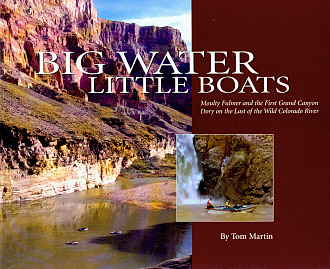
Best of 2012
Big Water, Little Boats. By Tom Martin, Vishnu Temple Press, Flagstaff, AZ. ISBN 9780979505560
In this elegantly designed book, Tom Martin chroncles the adventures of the pioneers of wooden dories on the Colorado River through the Grand Canyon. Martin focuses on Moulty Fulmer and Fulmer's innovative and ground breaking dory that he constructed named the "Gem."
The river was truly wild then before the advent of the Glen Canyon Dam, and in one chapter, Martin tells the story of a 1957 trip when the Colorado was running at an amazing 126,000 cubic feet per second. (The average flow on the Colorado River these days is 15,000 cubic feet per second.)
His descriptions of 1950's river trips are a joy to read and revealing, in many ways, of the dynamics of egos and personalities when a group of people live closely together and face the challenges of a wilderness river.
At the conclusion of the book, Martin re-constructs a replica of Fulmer's "Gem" and with it attempts a run down the canyon. It turns out to be the perfect finishing touch to this fine, new historical text, certain a find a place among exceptional works about the river runners of the Grand Canyon.
For a more complete review, see Big Water, Little Boats
Amazon.com: More Information or Purchase
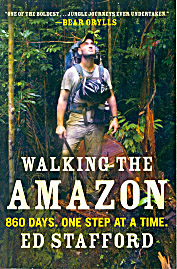
Honorable Mention: Best of 2012
Walking the Amazon: 860 Days. One Step at a Time. By Ed Stafford, Penguin Group, New York. ISBN 9780452298262
Tangled jungles, sweltering humidity, fetid swamps, bitting ants, lethal snakes, and a beaucratic maze of governmental and native permits, author Ed Stafford lived and survived a nightmare. He set out with a friend at the Pacific Ocean in Peru and together they crossed the Andes, reaching the real starting point of the journey: the source of the Amazon.
Somewhere afterwards, his friend bows out and others join him from time to time, but finally, he ends up with forestry worker "Cho" Rivera who, committed as he is, walks all but four months of the twenty-eight month epic.
There's nothing fancy about Stafford's writing. It's a plainly told narrative, but I guarentee that once you start the book, you won't be able to put it down - even if you're like me and don't have a particular affinity for jungles. He re-creates the journey: the day-to-day grind, the dark and wet, steamy forest, and the internal debate going on his mind which leads him chillingly close to madness.
The Amazon is not all tangled jungle. We learn that towns and roads have increasingly encroached on this last outpost of rain forest wilderness, and where they lie close to the river, he follows roads and forest trails. At night, when near outposts of civilization, he stays with families, or recovers in hotels in small and large cities. Frequently, he is re-stocked with food and supplies. He keeps admirers informed of his progress with regular blog reports.
But, he is never lured away from his goal, and along with his trusty and grounded companion Cho, he heads back again and again for days and weeks at a time in the dark Amazon forest.
Amazon.com: More Information or Purchase
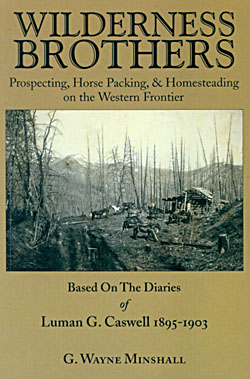
Honorable Mention: Best of 2012
Wilderness Brothers: Prospecting, Horse Packing & Homesteading on the Western Frontier. By G. Wayne Minshall. Steamside Scribe Press, Inkom, ID. ISBN 9780984949007
Honorable Mention: Best of 2012
The book centers on the diaries of Luman Caswell who along with his brother in the 1800's, take a 2,500-mile journey by buckboard wagon and horseback, eventually settling along Big Creek deep in the mountainous wilderness of central Idaho. It is, in fact, still wilderness to this day.
There's much here more than homesteading. In the wilderness, a day or two journey from their small ranch, Caswell and his brothers eventually discover enough gold that they set off what would become one the last great gold rushes: the Thunder Mountain rush.
For a more complete review, see: Wilderness Brothers
Amazon.com: More Information or Purchase
Links to the Best Books of Other Years: See List

 Best of the Year Reviews
Best of the Year Reviews